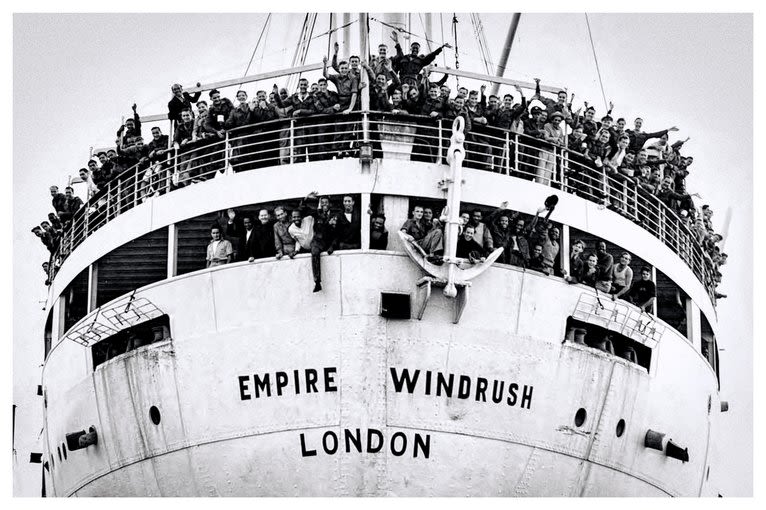
Written by Lillian , Head of the Data & Analytics of the Young People Advisory Board (Photo by English Heritage)
The Windrush is the name given to the Caribbean generation that immigrated to the UK between 1948 and 1971. The HMT Empire Windrush, a ship that transported 492 passengers from Jamaica to Tilbury, Essex, in June 1948, is the source of the name. The Windrush generation arrived in the UK looking for employment and a better way of life. The promise of full citizenship and the post-war economic boom drew them in. Since many of them had fought for Britain in World War II, they had a sense of allegiance to the country. The Windrush generation significantly influenced British culture. They contributed to the development of the UK’s cultural landscape by working in various facets of the economy. They were also crucial in the struggle for racial equality. In order to fully interpret how they contributed in their struggle for racial equality, we need to delve into the history of Windrush.
Let’s go back to the beginning of Windrush migration. Everyone who was at the time a British subject by virtue of having been born in a British colony was granted citizen of the United Kingdom and Colonies status as well as the right of residence in the UK by the British Nationality Act of 1948. Immigration increased because of the action and support from British government initiatives throughout the Caribbean. Britain experienced significant labour shortages in 1948 as a result of the Second World War, and between 1948 and 1970, almost 500,000 people from the Caribbean immigrated to Britain. The group of immigrants that arrived in the UK at this period is known as “the Windrush generation.”
Working-age people and a large number of kids flew from the Caribbean to the UK to see parents or grandparents, or they accompanied their parents while travelling without their own passports. They were not required to present any documentation when entering the UK, even after revisions to immigration regulations in the early 1970s. Many people in the UK worked or went to school without leaving behind any official records of their activities, other than those documentations that apply to all citizens who were born in the country.
After 1948, many of the immigrants’ home countries gained independence from the UK, making them citizens of the nations they had previously called home. Former colonies, now Commonwealth nations, were subject to legislative restrictions on visiting or working in the UK during the 1960s and early 1970s. Before 1973, anybody who entered the UK from a Commonwealth nation was automatically given the right to live there permanently, unless they had spent more than two years elsewhere. Many individuals in this category were never required to give documentary proof of their right to remain at the time, or over the following forty years, where many continued to live and work in the UK, believing themselves to be British.
According to the Immigration and Asylum Act of 1999, Commonwealth nationals who have lived in the UK for a long time are particularly exempt from being forcibly deported. Since Commonwealth citizens who had been residing in the UK before to January 1, 1973, were “adequately protected from removal,” this provision was not included in the 2014 Immigration Act.
The Windrush Scandal of 2018
The year 2018 saw the revelation that hundreds of members of the Windrush generation had been wrongfully deported or imprisoned by the UK government. This scandal sparked widespread rage and prompted an open investigation. The scandal sparked widespread rage and prompted an open investigation which concluded that the government had discriminated against those who had arrived in the Windrush era, based on their race. More specifically the immigration status of those from the Windrush generation was not properly recorded. As a result they were treated as second class citizens – ‘people were unjustly arrested, denied legal rights and faced deportation in at least 83 cases in 2018. They were erroneously deported by the Home Office from the UK. The scandal led to the resignation of Amber Rudd as Home Secretary in April 2018 and the appointment of Sajid Javid as her successor. The scandal also prompted a wider debate about British immigration policy and Home Office practice.
According to Wendy Williams, inspector of police, the independent Windrush Lessons Learned Review performed in March 2020 found that the Home Office exhibited ignorance and thoughtlessness, and that what occurred was foreseeable and avoidable. It also revealed that officials had made irrational demands for several documents to prove residency rights while tightening immigration laws with total disregard for the Windrush generation. Even though a compensation programme was introduced in December 2018, by November 2021 there was only an estimate of 5% of victims who had received any compensation and 23 of those who were eligible had passed away prior to receiving pay-outs. In 2021, three different parliamentary committees published papers denouncing the Home Office’s inefficiency and tardiness in providing victims with reparations, and they demanded that the Home Office be removed from control of the programme.
Windrush and Its Impact on the British Society
In the UK, the Windrush affair has had a significant impact. It has sparked a new discussion about immigration and race and called into question the government’s commitment to equality. The scandal has hurt the UK’s standing internationally. A significant period in British history is the Windrush generation. They merit respect because of the substantial contribution they have made to the UK. The Windrush affair serves as a reminder of the significance of the fight for racial equality and the defence of all citizens’ rights.
The Windrush Lessons Learned Review (2020)
The Windrush Lessons Learned Review (2020) found that the Windrush scandal was caused by a “culture of disbelief” and a lack of inclusion within the Home Office. The report recommended several changes to promote inclusion and equity for the Windrush generation, including:
- Making it easier for people to check their immigration status.
- Providing more support for people who have been affected by the Windrush scandal.
- Changing the culture within the Home Office to be more inclusive and welcoming
The Equality and Human Rights Commission (2021)
This report found that Black people in the UK are still more likely to be stopped and searched by the police, to be denied a job, and to be discriminated against in other ways. The report called for action to promote inclusion and equity for Black people in the UK, including:
- Increased investment in Black communities
- Changes to the criminal justice system to address racial bias.
- More education and awareness about race and racism
Inclusion and equity are essential for creating a just and fair society for all, including the Windrush generation. By taking the steps outlined above, we can help to ensure that the Windrush generation has the same opportunities as other British citizens, and that their contributions to British society are recognized and celebrated.
Institutionalised Racism
In the Windrush generation, there are thought to be 500,000 people. Despite being born in the UK, many members of the Windrush generation did not necessarily receive British citizenship. In the UK, the Windrush generation experienced prejudice, including being turned down for jobs, housing, and medical treatment. The UK’s immigration system has undergone significant reforms because of the Windrush scandal. Divisive immigration laws proved that Black people were presumed to be guilty until proven innocent. The fact that the Windrush generation arrived in aid in Britain’s post-World War II economic recovery only makes this situation worse. These immigrants gave aid when it was needed, but were betrayed when their assistance was no longer required. Many lost their jobs and homes. Many lost access to health care with some even being denied urgent healthcare including cancer treatment. One patient in particular stated “‘I thought they were killing me,” when NHS trust halted asylum seeker’s cancer treatment.
The State has often let down ethnic minorities by failing to include Black people in the promises it makes to its citizenry. The ‘ignorance’ seems more intentional when a policy disproportionately harms a large group of people who can be identified by their race. Consequently, the effects of government policies on Black Britons are never a priority. Black people in Britain have long believed that we are only considered after the event, and in some circumstances, not even considered at all. The UK can be unfriendly to Black Britons, both legal and illegal residents. Institutionalised racism is insidious, and it exists whether some people want to see it.
Forging Ahead on Inclusion, Equity and Equality
For all people, including the Windrush generation, to live in a just and fair society, inclusion and equity are crucial. The Windrush generation is a wonderful example of how diverse British society is and how crucial it is to strive for equity and equality. It further emphasised the necessity of increasing Black people’s inclusion in the UK system. Making sure that the Windrush generation has access to the same opportunities as other British citizens, regardless of their immigration status, is one way inclusion and equity may be encouraged for them. This pertains to having access to jobs, housing, healthcare, and education. Additionally, it entails making sure they are not subjected to prejudice because of their race or ethnicity. The UK government should take intentional steps to promote this inclusion by announcing and putting into effect laws that will prevent the treatment of Black immigrants from being prejudiced.
Recognising and celebrating the contributions of the Windrush generation to British culture is a crucial step in promoting inclusion and equity for this group of people. The NHS, the armed forces, and the arts are just a few of the fields in which the Windrush generation has had a big impact on the UK. It is crucial to honour their accomplishments, tell their tales as a monument, and urge immigrants who are already living in the UK to learn about the welcoming system and how they can help make it more efficient and functional for everyone. Families or people who were a part of the Windrush generation must be compensated, and all additional restrictions on their rights and freedoms must be removed. This can ensure that the ideals and principles that govern the United Kingdom as a whole, such as democracy, rule of law, individual liberty, respect and tolerance, equality are respected. These principles are what make the UK a great country and unite its citizens. It will be unfair if some people enjoy these values more than other people.
Conclusion
It is crucial to ensure that the experiences of the Windrush generation are never forgotten or replicated. They act as a sobering reminder of the significance of upholding equal legislation, and prevent such unfair treatment. Since equality and human rights must be at the centre of everything we do if we are to be a fair and equal society, public services should function successfully for all their users, regardless of background. Other government agencies might take note of this lesson and ensure that all necessary measures are taken to fulfil their legal duties and provide public services and policy that benefit all citizens.
